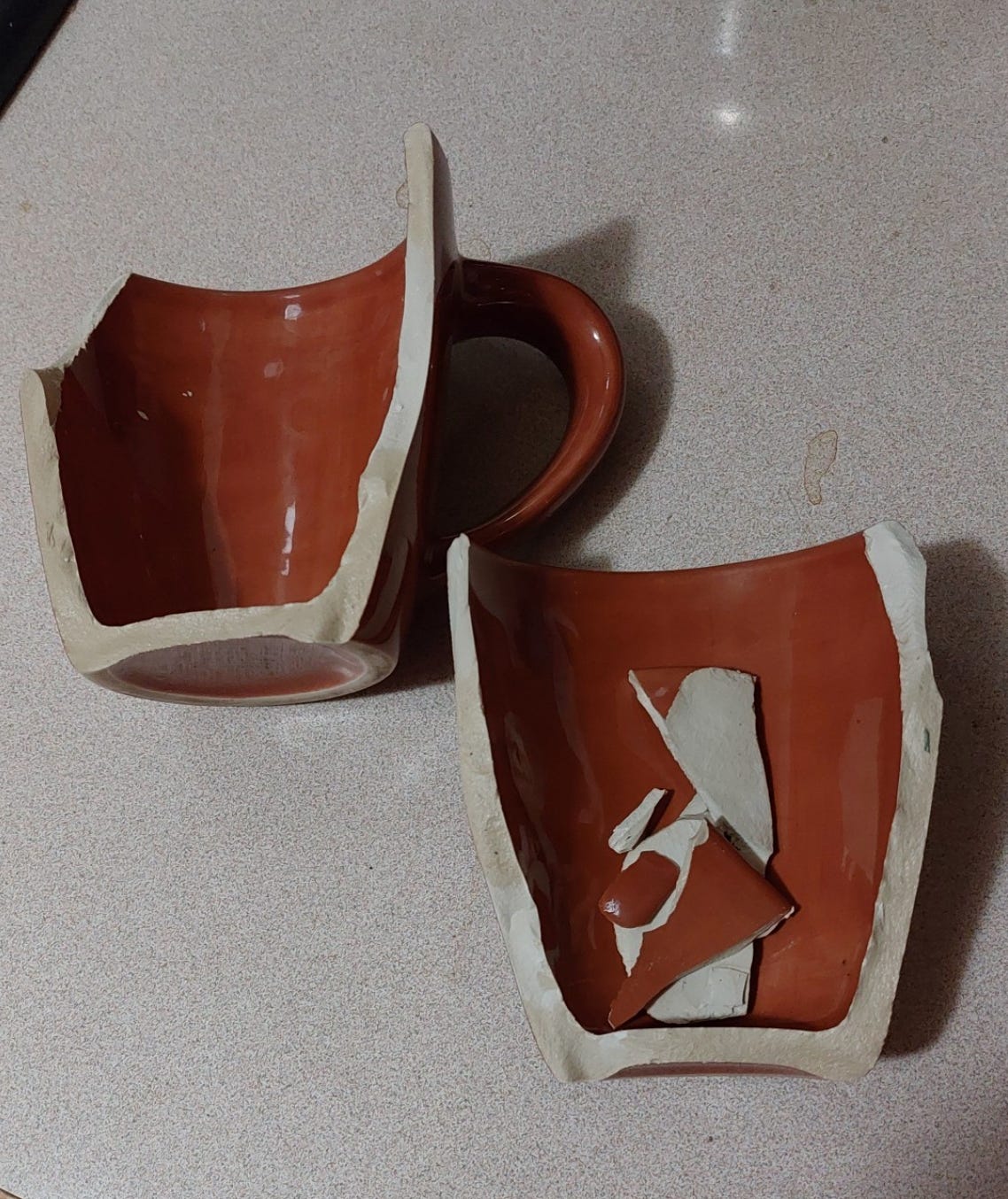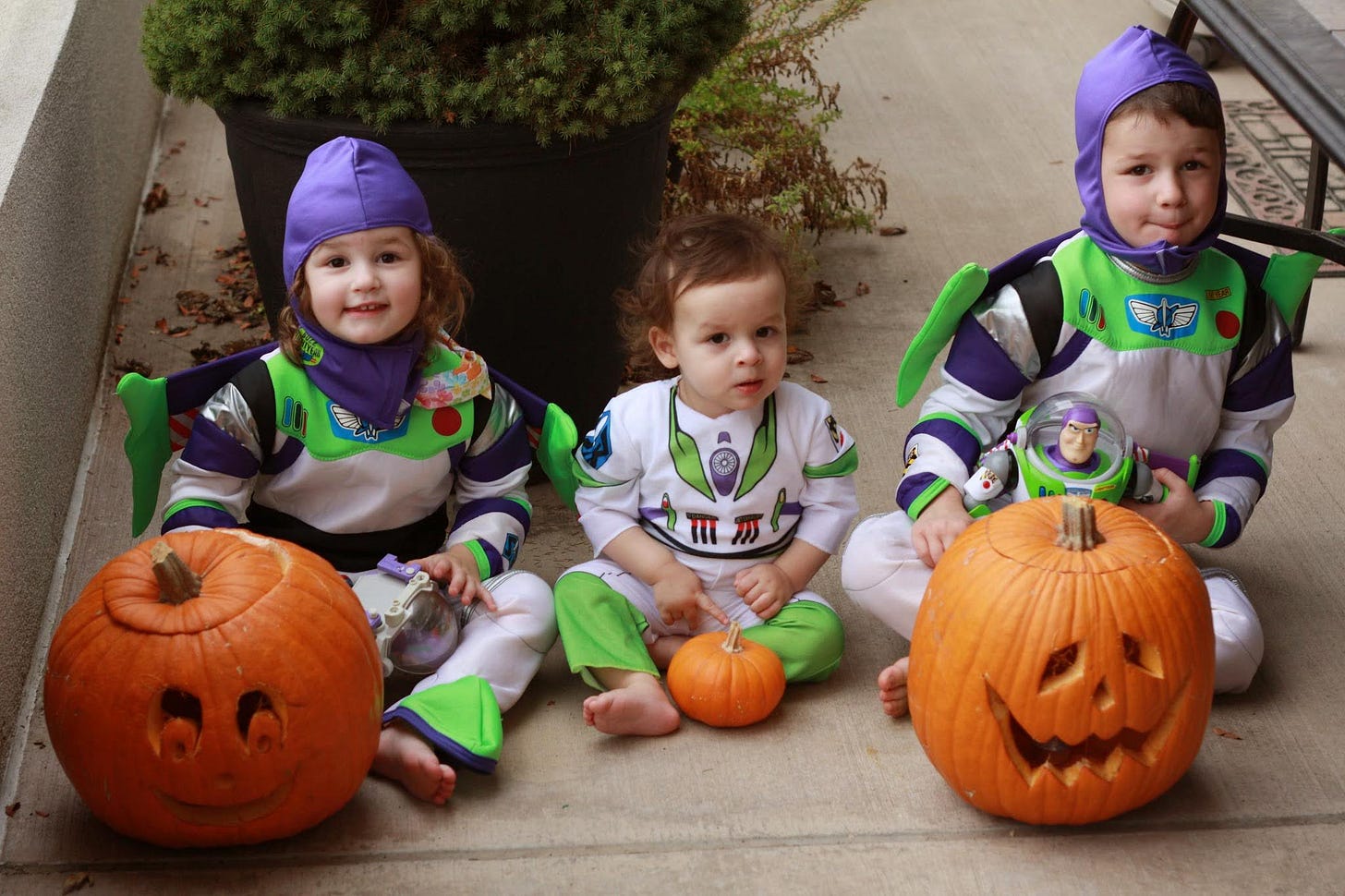Parents who have lost children is a club that I wish had no members. I saw a post from a fellow child-loss Dad, who had been given a very cherished gift from his son. A simple but sweet coffee mug. Unfortunately, that cup tumbled from his grasp and shattered. With it the fragile veneer of OKness broke too. We pretend till we can’t, we erupt and quake until we don’t.
Every token gift, every art piece, photograph, and place you have gone with your child becomes sacred. But even sacred things and places follow the law. Laws of physics, gravity, and even entropy. The mug is a thing. And if it slips from your hands it accelerates toward earth following the laws. Things aren’t important, people are. But both can be broken, and even with the most meticulous level of kintsugi1, not all broken things are able to be made the same again. The thing becomes enmeshed with our memories, our feelings, and our hearts, but the physical state change permanently alters.
Feelings are for Feeling
It is truly difficult to feel it all, or even a little bit of it some days. I appreciate everyone bringing Drew Petersen to Boise for his “Feel it all” screening. His calling, his raw and honest discussion on life, mental health challenges, hope, love, and the need for vulnerability is a state change that is so desperately needed. Clearly his story is evidence that we often climb the hardest mountains not because it’s fun, not because it feels good, and definitely not because you’re aiming to be liked, but because it needs to be climbed. Our soul needs to climb it. But also, that climbing the hill might not be enough. It might be a distraction from the change that is needed. The climb might be out of a sense of obligation, or a false sense of duty. We keep climbing because we are told that it is the path that society will reward you for climbing. Maybe it isn’t even the mountain we are meant to climb, maybe it is a path to a sense of achievement that we seek from others, and not one of fulfillment. It is very difficult in life to know when it is best to turn around from the hill we are climbing, and climb one more befitting of our own true selves.
The illuminated path of fulfillment is blocked by layered boulders of socially constructed “niceness.” Protected by institutional habits that defend the status quo, preserve funding streams, pathologize truth tellers, and silence the vulnerable. If you learned anything from Maisa, it’s that kindness doesn’t always come wrapped in sweet phrases or agreeable smiles. True kindness insists on truth, even when truth is the least agreeable guest at the table. Even with a healthy dose of snark. Kindness is often uncomfortable.
A little while back, I wrote about the lesson Maisa taught me about the difference between being nice and being kind in Follow the Money. “Nice” will keep things comfortable and compliant, but “kind” is willing to disrupt comfort for justice and change. Nice enables abusers and toxic systems. Institutions, especially government and public education, are notorious for wielding “nice” as a shield while simultaneously dodging hard conversations about disability, mental health, and institutional failures or crimes. The reflex seems to be to meet tragic loss with platitudes, memes, or silence. The price for that illusory comfort, too often, is paid in the currency of the suffering children who don’t fit the mold, or can’t keep up despite being told that they won’t be left behind. Worst of all, the price is paid not by those institutions that seek to cover totems of discomfort and failure in sand to avoid changing their default state. Just like the coffee mug must follow the law of physics on its path to the hard floor, I want our schools to follow the law that we have to guide our institutions to protect those that most need protecting. Change isn’t easy.
Using one Broken System to Kintsugi Another
It’s nice to have meetings, assemble committees, and post photos about “celebrating neurodiversity.” But real kindness means confronting the perverse monetary incentives, the budget-driven attendance formulas that push kids beyond their breaking point, and the deep-rooted aversion to identifying disabilities that don’t fit the budget. We have been marginalized, shunned, excluded and ignored. We have sent nice e-mails and letters. We have sent demand letters and requests for dispute resolution. They were all completely ignored.
Maisa’s sign as a Libra fits with her strong innate sense of justice. She often was seeking balance in the scales. I have a somewhat jaundiced eye toward litigation. It is difficult to cipher what can, and what cannot be fixed with litigation in the legal system. Filing a lawsuit isn’t “nice.” Litigation is agonizing. It is excruciatingly expensive, painful and retraumatizing. It means reliving every ignored warning, every unanswered cry for help, every bureaucratic sidestep. And there were a lot of them. Over many years.
A past version of myself, fresh from Twin Falls High School, was pretty decent at climbing hills. I decided to climb the hill all the way to law school at Duke, to keep climbing and climbing, but the bankruptcy lawyer suit never seemed to quite fit. I decided to make a change, and not practice law. I decided to go back to the farm, back to Idaho, to make farm loans. Maisa called me “Farmer Yams.” I surely had moments where I questioned the decision, the loan debt, and whether it was, in hindsight, a poor idea to have gone to law school. But I also knew it was my path, and that path is what led me here. To now. Maybe there were more reasons for me going to law school than I knew at the time. Perhaps it was to get me ready to climb another difficult hill.
If litigation is a hill, it is more like Mount Trashmore than Mount Justice. But sometimes it is the only path to use one broken system to try and reform another. The path toward justice, to change, to truth. That is why we decided, after much deliberation, soul searching, and research to pursue a lawsuit against the Boise School District and Idaho Department of Education. I wish it were different, but it appears that litigation is the only love language they are hearing right now. Our attempts to resolve our issues via other routes were completely ignored. I wish many things were different. I wish I had more help. If you are an attorney willing to help litigate, to advocate for the rights of disabled children, we would love the help. Just call for help right?
That’s why this federal complaint was filed; not as an act of grief or self-serving anger, but as an act of radical kindness and civil action to promote long overdue systemic change. The lawsuit screams in legal jargon, that the status quo is unacceptable. It harmed us, it continues to harm disabled and vulnerable children every moment until we collectively decide to make changes. It will take more than a t-shirt, a pithy sign filled with royalty puns to make this better. It takes all of us. To stop accepting the unacceptable so that we don’t have to bear the unbearable.
Hear thee, Hear thee the complaint alleges, in part
Systematic and continuing refusal to identify, assess, or support disabled children, in direct violation of federal laws (Section 504, ADA, IDEA).
Deliberate indifference from the school district and Idaho Department of Education toward students with disabilities and mental health needs, triggered by policies that punish the disabled and reward the compliant.
Death, trauma, and exclusion are not each finite isolated tragedies, but are predictable outcomes of policies designed to maintain appearances and protect budgets.
Destruction of records, silencing displays of grief, and retaliatory measures when families refuse to “play nice” and push for change.
It’s tempting to think that waving a protest sign, sending a heartfelt email, or posting a hashtag might break down institutional silos. Unfortunately, institutions have immune systems built to repel discomfort and insulate authority. The fight for kindness sometimes requires the sharp tool of litigation. Maybe we can use one branch of judicial power to force another branch to do what the legislative branch already has told it to do.
And let’s be clear, this isn’t war on teachers, staff, or even most administrators as individuals. They need more support too. The system itself, built around perverse incentives and survival reflexes, is what stands between our kids and the support they deserve. Litigation is the kind thing to do, not because it’s easy, but because it forces accountability, compels introspection, and rips off the bandage of denial. Lady justice is blind, but not powerless, and she stands as the legal right and obligation to seek accommodation for her, and our children’s disabilities. Sometimes the kindest act is to disrupt, to challenge, to speak truth to power, and to refuse to pretend. Sometimes the justice Maisa loved means stepping into the courtroom, not the principal’s office, because only then can institutions be forced to remember the children they left behind.
It’s past time for Idaho to be more kind and less nice, for the sake of every child who deserved more than just pretending, and every truth-teller who paid dearly for the privilege of refusing to shut up and sit down.
Call to action
If you are a litigator and willing to help, please reach out. If you know a litigator that is willing to help, please reach out. If you are a good communicator, good with media, or educating through social media we would love the support. Contact us through direct message or call 208 550 8216 and ask for farmer yams.
One cited origin involves Ashikaga Yoshimasa, a shogun who sent a broken tea bowl to China for repair. The unsightly, metal-stapled return inspired him to have Japanese artisans find a more aesthetic solution, which became kintsugi.





James, this is a powerful and well written post. I understand where why you are taking these steps and support you and your family. As someone who has been mistreated for my disability in every job I’ve had in teaching, I believe you’re taking a necessary step for change. Also, I remember the Buzz years and just love this photo of the kids.💕
Thank you, Betsy, it is really difficult to understand until you have to walk in someone else's shoes, roll in their wheelchair, or swap neurotypes. It is difficult when the systems, laws and institutions in place to help accommodate disability don't, won't and actually contribute to more harm. I surely have a better understanding of that now than I did.